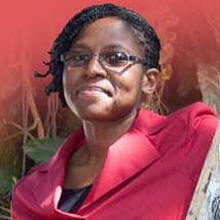
 "What's happening with Our Climate? In Search of Answers"
"What's happening with Our Climate? In Search of Answers" 
Tannecia Stephenson
Department of Physics
The climate of a location affects the types and timing of many activities that occur there. Some of these activities are related to agriculture, tourism, human health, water uses and sports. It is important that we try to understand whether or not our climate has been changing, whether or not it will change as we proceed towards the end of the century, and what we can do to either lessen or cope with these changes.
One of the international efforts that attempts to determine future climate across different regions is the Coordinated Regional Climate Downscaling Experiment (CORDEX). CORDEX is a programme activity of the World Climate Research Programme (WCRP) through its Working Group for Regional Climate (WGRC). It seeks to generate information on future climate for the majority of the populated land regions, and to make this information readily available so that ways may be devised to reduce the negative impacts.
The CORDEX uses two approaches: dynamical downscaling and statistical downscaling. Dynamical downscaling is a method of obtaining climate change information from climate models (computer models) over a limited area at scales of 50 km or less. Statistical downscaling is an approach for obtaining climate change information for a specific location by developing statistical relationships between local climate variables (for example, rainfall and temperature) and large-scale predictors, and using this relationship with computer model results to determine what the future climate at the location may be. The dynamical downscaling activities within the CORDEX are well advanced and are available for regions such as North America, South America, Central America, Europe, Africa, South Asia, East Asia, Central Asia, Australia, the Mediterranean, Antartica and the Artic ( Figure 1 refers). The Climate Studies Group, Mona(CSGM) at the University of the West Indies, along with partnering institutions in Cuba, Belize, Barbados, Suriname and Guadeloupe, has undertaken experiments over the Central America area.
The statistical methods have not yet been used in a coordinated way and is, therefore, the next phase of the CORDEX activities currently underway. To start this community effort for statistical downscaling within CORDEX, the first workshop on statistical downscaling was held at the International Centre for Theoretical and Applied Physics in Trieste, Italy. A CSGM representative was among the invited participants. The workshop, through working group discussions, outlined possible experiment design, modes of participation, and identified a core community of participants. The workshop outcome will form the basis of participation by a larger community. This current initiative will allow examination of a more extensive suite of future climate information for the Central America region, using a number of statistical techniques that have been developed globally. With greater understanding of present and future climate change, the researchers will be able to work with government, private sector, local communities and regional and international partners to craft the Caribbean's response to a changing climate.
There are advantages to the use of statistical methods for determining future climate. These methods do not require as much computing resources as dynamical methods and therefore can easily be applied. Another important advantage is that they can be used to provide information at a particular location, which is very important for many climate change impact applications. Therefore, future possible impacts of a changing climate may be obtained for any sector that may be linked with the climate. Additionally, outputs of these methods may be compared with those obtained from climate models and may contribute to better determining the future climate over that region.